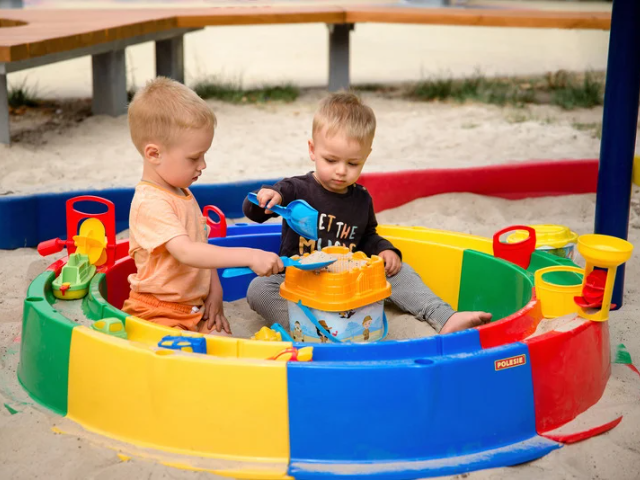We don’t usually think of child development and play at the same time. As parents, most of us think of play as something fun without a lot of learning value, but research shows that play is actually essential. Play lays the groundwork for healthy childhood development. Our children can explore the world, promote physical skills, and practice social interactions through play. Scientific evidence shows that play supports healthy brain, physical, and social-emotional development. It turns out that our children are wired to learn through play. Our kids have an innate drive that develops essential connections in their brains.
Supporting Whole Child Development
One of the ways play promotes brain development is through hands-on learning. Our children are much like little scientists. They move objects, explore environments, and test theories in a low-risk environment. Doing so allows them to learn about topics such as gravity as well as cause and effect.
Social Development and Play
Social development is promoted when children play with others. Playing with others allows them to practice communication skills, learn about cooperation, and even navigate conflicts (ahem, who took my block?). These skills continue to grow throughout life. As adults, we can appreciate their value even today, but they are rooted in early childhood!
Emotional Development and Play
During play, our kids experience many emotions and learn how to regulate those emotions. They may feel happiness after building a fort with another child. Later, they may experience frustration at having a toy they were playing with taken away. Through play, kids experience, identify and start to manage those emotions. Communication and speech development also play a role here. We can support our children by teaching them to name their feelings. It is a great time to grow their vocabulary and teach them to cope with strong emotions. Additionally, play is a form of stress relief for young kids! This contributes to their mental and emotional well-being.
Motor Development and Play
Lastly, play also provides an excellent context for motor development – the physical growth and strengthening of your child’s bones and muscles and their ability to move and touch their surroundings. Motor development is a significant part of physical development during early childhood. Motor development is divided into either gross motor or fine motor development. Gross motor skills are about controlling the larger parts of the body, such as when a child is riding a bike to the park. Fine motor skills focus on manipulating smaller parts of the body. When a child strings beads to make a bracelet, they grow their fine motor skills. Movement also helps with the integration of the senses, balance, and agility!
Types of Play
As they grow, children naturally engage in a variety of different types of play appropriate to their developmental level. Research has outlined four types of play in childhood:
- Social play (like board games or dress-up)
- Object play (like using a stick as a horse)
- Outdoor play (like sports or recess)
- Rough-and-tumble play (like free play or pat-a-cake)
The Role of Parents in Play
Children thrive on play, and without it, they suffer. Parents have a significant role to play in our children’s play activities. First, kids benefit when parents make playtime a daily priority. In our hectic modern life, it can be challenging to protect playtime. Knowing the value of play and its role in shaping the developing brain helps! Second, parents can get involved in their child’s playtime. Being involved in playtime helps parents build a better relationship with their kids . It combines the benefits of play with the benefits of a nurturing relationship, supercharging development!
Make Playtime, quality time!
Quality over Quantity
When joining in playtime with a child, it’s important to remember that quality is more important than quantity. For example, Just 10-15 minutes of quality playtime can make a significant impact.
Focus on your child
Show them that they are a priority by giving them your undivided attention during playtime.
Get on their level
- Sit at your child’s level.
- Maintain eye contact.
- Use positive facial expressions (smile!) to show your excitement.
- Use open body language to show that you are ready to play (versus control) this special time together.
Follow your child’s lead in play
This helps your child develop a sense of agency and shows them that their opinions matter to you. Avoid correcting your child during play to let them take the lead.
Describe, don’t question
As adults, we often ask children many questions, which can be overwhelming. Instead, describe what your child is doing and mimic their actions to keep them engaged and in control.
Resist the “Rescue Them” Urge
Playtime is a safe space for kids to experience failure. Age-appropriate failure can help them develop frustration tolerance, critical thinking, and independence. Allow your child to experience some failure and overcome it during playtime.
Have fun: Shared enjoyment is an essential part of playtime for both you and your child, so try to have fun and enjoy the moment together.




